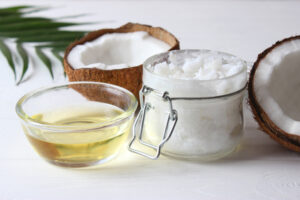I’ve never wanted to be that mature woman whose response to “How are you?” was “Oh, my aching back.” I also didn’t want to look in the mirror and think, “Oh, my aging skin.” Since starting my day with a regular dose of cannabidiol (CBD) oil, I’m finding that the aches and pains that were becoming commonplace for me are now reduced. Lately, I’ve been thinking of exploring CBD topical creams for aging skin, so I asked several women about their experiences with CBD topicals.
FOLLOW US ON FACEBOOK & INSTAGRAM
Women Love Their CBD Topicals
CBD topicals are typically creams, lotions, oils, ointments and salves. There are many to choose from in places where cannabis is legal, but Marie Peterson in Wyoming makes her own.
“It helps my skin with breakouts due to hormonal changes and moisturizes for super-soft skin,” says Marie. She adds that in addition to helping her reduce skin irritations, CBD topicals have the added benefit of relieving underlying pain. Another bonus for Marie is that the CBD topicals help her grandson address his eczema better than the medications he was prescribed.
Camille Ritchie in Vancouver says she uses a CBD-infused coconut oil on her face to treat eczema and for its anti-aging properties. She’s also using it to protect against another major cause of aging skin: the sun.
“I’m trying [my CBD-infused coconut oil] as a sunscreen and after-sun treatment,” Camille explains. “I’m hoping it will help diminish dark spots too, but we shall see.”
Camille says she saw fast, impressive results from the CBD topicals on her eczema and is waiting to see how well they help her on the aging skin front.
Wendy Pagaduan, founder of Clean Coconut Skincare & Wellness, points out that CBD—and the cannabis plant overall—is “packed full of vitamins, minerals, proteins and fatty acids, all of which encourage skin health.” Antioxidants may prevent or delay certain types of cell damage and can be found in foods and plants, including many fruits and vegetables.
According to Wendy, CBD is also moisturizing and can reduce the itching that comes with dry skin. And she, too, mentioned how CBD topicals are effective for eczema as well as a natural way to treat other skin conditions.
Doctors Weigh In on CBD Topicals for Skin Issues
I turned to a naturopath for a bit more about the skin-healing properties of CBD.
“CBD is anti-inflammatory and anti-bacterial, so it could help with inflammatory skin conditions such as dermatitis as well as acne,” says Dr. Elaine M. Burns of Southwest Medical Marijuana Evaluation Center.
Elise Ho in Southern California holds two doctoral degrees, one in naturopathic psychology and the other in natural health. She uses a CBD-based anti-aging cream and is impressed with the results.
“CBD does amazing things for your skin,” says Elise, echoing that it has anti-inflammatory and anti-bacterial properties that can help with acne and dry skin. “It can also help with the overall balance of your endocannabinoid system [when consumed],” she says. Achieving balance, or homeostasis, is paramount to maintaining a healthy body.
Quick Tips on Using CBD Topicals
Any CBD product you choose will only be as good as its ingredients and manufacturing process. As with any skincare product, particularly for anti-aging, beware of exaggerated claims about what the product will do for you. Shop around for a reasonably priced product, but know that CBD topicals can be pricey, in the $50–100 range for a small container.
When looking for a CBD topical, also consider the following:
-
Hemp-derived CBD products are the easiest to obtain and ship, but may not be as effective as whole-plant CBD topicals. Still, they’re a great option for people living in states without marijuana laws on the books.
-
Check the other ingredients in your CBD topical to ensure you aren’t sensitive to anything else in the product.
-
Start by applying the CBD product to a small patch of skin, and wait 24 hours to see if you have a reaction. If you do, don’t apply further and seek out another product. CBD itself should not be reactive, but there’s no guarantee of this.
-
Store CBD products in a place with a stable temperature and away from extreme light, heat or moisture. You can also store CBD products in the refrigerator. Depending on the carrier substance—such as coconut oil—it might solidify when cold, but return to its original consistency at room temperature.
Because of the legal issues surrounding cannabis and CBD, make sure you know the difference between hemp-derived CBD and cannabis-derived CBD products with THC. While many people say “hemp-derived CBD is legal everywhere,” that’s not entirely accurate. It’s critical to know the law in your area as there’s some confusion around what you can order online depending on where you live.
Photo credit: Marivi Pazos






